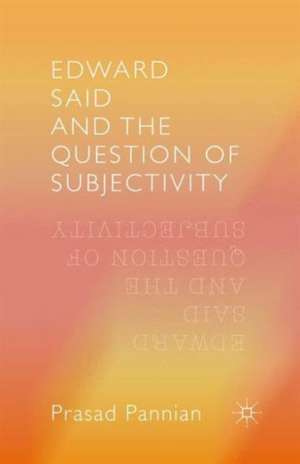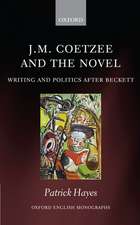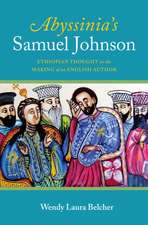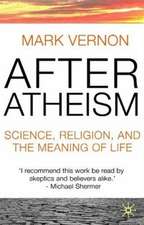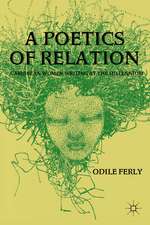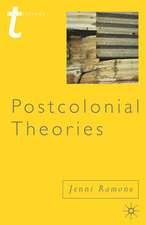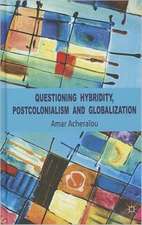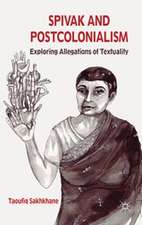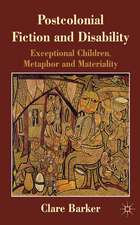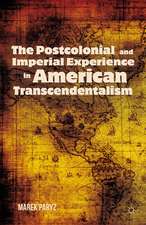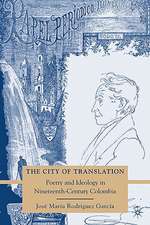Edward Said and the Question of Subjectivity
Autor Pannian Prasaden Limba Engleză Paperback – 5 iun 2016
| Toate formatele și edițiile | Preț | Express |
|---|---|---|
| Paperback (1) | 381.98 lei 6-8 săpt. | |
| Palgrave Macmillan US – 5 iun 2016 | 381.98 lei 6-8 săpt. | |
| Hardback (1) | 387.58 lei 6-8 săpt. | |
| Palgrave Macmillan US – 20 ian 2016 | 387.58 lei 6-8 săpt. |
Preț: 381.98 lei
Nou
Puncte Express: 573
Preț estimativ în valută:
73.11€ • 79.45$ • 61.46£
73.11€ • 79.45$ • 61.46£
Carte tipărită la comandă
Livrare economică 21 aprilie-05 mai
Preluare comenzi: 021 569.72.76
Specificații
ISBN-13: 9781349559367
ISBN-10: 1349559369
Pagini: 205
Ilustrații: XII, 205 p.
Dimensiuni: 140 x 216 x 15 mm
Greutate: 0.27 kg
Ediția:1st ed. 2016
Editura: Palgrave Macmillan US
Colecția Palgrave Macmillan
Locul publicării:New York, United States
ISBN-10: 1349559369
Pagini: 205
Ilustrații: XII, 205 p.
Dimensiuni: 140 x 216 x 15 mm
Greutate: 0.27 kg
Ediția:1st ed. 2016
Editura: Palgrave Macmillan US
Colecția Palgrave Macmillan
Locul publicării:New York, United States
Cuprins
Foreword; H. Aram Veeser
Introduction: Edward Said and the Politics of Subjectivity
1. Orient, Occident, and the Constitution of Subjectivity
2. The Subject in Overlapping Territories and Intertwined Histories
3. Politics of Exile, Act of Memory, and Recuperation of the Subject
4. Intellectuals as Subjects of Action in the Age of New Humanism
5. A Shift in Intellectual Trajectory: The Marxist Connection
Conclusion: Towards a Saidian Paradigm
Introduction: Edward Said and the Politics of Subjectivity
1. Orient, Occident, and the Constitution of Subjectivity
2. The Subject in Overlapping Territories and Intertwined Histories
3. Politics of Exile, Act of Memory, and Recuperation of the Subject
4. Intellectuals as Subjects of Action in the Age of New Humanism
5. A Shift in Intellectual Trajectory: The Marxist Connection
Conclusion: Towards a Saidian Paradigm
Recenzii
"This comprehensive study does ample justice to Edward Said's critical thought, illuminating the profound importance that Said placed on criticism in the service of responsibility and dissent. Said's refusal of both identity politics and impersonal systems gets full treatment in this sympathetic yet critical study. The book will be a valuable resource for students of postcolonial studies." - Gauri Viswanathan, Class of 1933 Professor in the Humanities, Columbia University, USA
"Prasad Pannian underlines the centrality of 'subjectivity' in Edward Said's activist secular humanism, formulated in response to postmodern and postcolonial deconstructions of identity, subjectivity, and agency. His novel readings of Said's major works are illuminated by his own commitment to overcoming differences that continue to undermine political agency. Highly recommended on both counts." - Arif Dirlik, Independent Scholar, USA
"A welcome addition to the growing body of scholarship on Edward Said and his legacy of non-humanist humanism, Prasad Pannian's book is an admirable endeavor to critically unpack the category of subjectivity in Said's work and account for its performance across uneven terrains and contradictory imperatives. In focusing on the relationship, in Said's critical agenda, between an exilic humanism and critical secularism, Pannian demonstrates how crucial it is for Said to reclaim, reform, and redeem humanism in the name of humanism." - Rajagopalan Radhakrishnan, Chancellor's Professor of English and Comparative Literature, University of California, Irvine, USA
"A learned and wide-ranging study of this major thinker, and a most invaluable addition to Saidian scholarship." - Kenneth J. Surin, Professor of Literature, Religion and Critical Theory, Duke University, USA
"Prasad Pannian underlines the centrality of 'subjectivity' in Edward Said's activist secular humanism, formulated in response to postmodern and postcolonial deconstructions of identity, subjectivity, and agency. His novel readings of Said's major works are illuminated by his own commitment to overcoming differences that continue to undermine political agency. Highly recommended on both counts." - Arif Dirlik, Independent Scholar, USA
"A welcome addition to the growing body of scholarship on Edward Said and his legacy of non-humanist humanism, Prasad Pannian's book is an admirable endeavor to critically unpack the category of subjectivity in Said's work and account for its performance across uneven terrains and contradictory imperatives. In focusing on the relationship, in Said's critical agenda, between an exilic humanism and critical secularism, Pannian demonstrates how crucial it is for Said to reclaim, reform, and redeem humanism in the name of humanism." - Rajagopalan Radhakrishnan, Chancellor's Professor of English and Comparative Literature, University of California, Irvine, USA
"A learned and wide-ranging study of this major thinker, and a most invaluable addition to Saidian scholarship." - Kenneth J. Surin, Professor of Literature, Religion and Critical Theory, Duke University, USA
Notă biografică
Prasad Pannian is Associate Professor of English and Comparative Literature at the Central University of Kerala, India. He has won the Edward Said Fellowship (2018-19) instituted by the Heyman Centre for Humanities, Columbia University, USA.
Textul de pe ultima copertă
Edward Said and the Question of Subjectivity explores the notion of subjectivity implicated in and articulated by Said in his writings. Analyzing several of his major works, Pannian argues that there is a shift in Said's intellectual trajectory that takes place after the composition of Orientalism. In so doing, Said forthrightly attempts to retrieve a theoretical and political humanism, as Pannian identifies, despite the difficult and sanguinary aspects of its past. He elaborates upon Said's understanding that only after recognising the structures of violence and coming to discern strategies of interpellation, may the individual subject effectively resist them. Pannian also explores Said's ideas on exilic subjectivity, the role of intellectuals, acts of memory, critical secularism, affiliation and solidarity before dwelling on his interface with Marxist thinkers such as Antonio Gramsci, Theodor Adorno, and Raymond Williams. This engagement marks Said's own subject formation, and shapes his self-reflexive mode of knowledge production.
